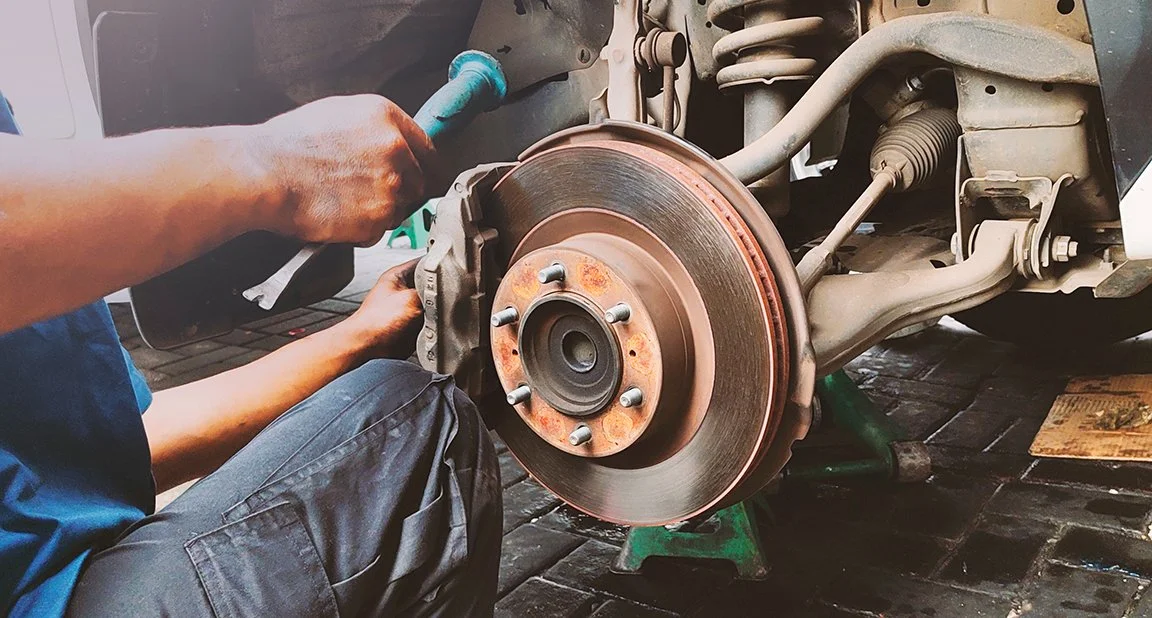
Our Brake Repair Services
Maintaining your car's brakes is crucial for any Texas motorist. You need to be confident your vehicle will stop when you hit the brake pedal. That's why it's recommended to have your brakes inspected at least once a year.
Discount Auto Shop: Your Trusted El Paso Brake Shop
DAS is El Paso's most reliable brake shop. Our team of highly skilled technicians is fully qualified to inspect and repair brakes on all types of vehicles. If you're in this part of Texas and your brakes need attention, schedule an appointment at Discount Auto Shop location today!
Your vehicle's brakes are essential for your safety on the road. When you need brake repair, don't trust just any shop. At DAS, our premium brake repair services are among the best in the industry.
We start every brake service with a thorough visual inspection of your brake and hydraulic systems. Once we identify the issues, we'll get to work. Depending on your situation, we can:
* Resurface your rotors and drums
* Replace your brake pads or shoes with premium parts
* Repack your wheel bearings
* Provide any other necessary maintenance or repair service
How Brake Systems Work
When you choose DAS for your brake service, you won't have to worry about a thing. However, understanding the basics of how your brakes work can be helpful.
Modern brake systems are highly effective at slowing and stopping vehicles thanks to over a century of development. While the precise inner workings vary by vehicle, all brake systems share common elements. Let's look at the key components and how they function together.
Hydraulics
* Master Cylinder: Think of the master cylinder as a pressure converter. When you press the brake pedal, it converts that physical pressure into hydraulic pressure, allowing brake fluid to travel to your wheel brakes.
* Brake Hoses and Lines: Shock-resistant brake hoses and steel-braided brake lines are responsible for delivering pressurized brake fluid to the braking units at each wheel.
* Wheel Calipers and Cylinders: In disc brake systems, calipers squeeze brake pads onto the rotor. For drum brakes, wheel cylinders push brake shoes into the brake drum. Both parts apply pressure to the brake system's friction materials.
Friction Materials
* Drum Brake Shoes and Disc Brake Pads: In disc brake systems, fluid from the master cylinder pressurizes the calipers, which press brake pads against the rotors to stop the vehicle. If your car has drum brakes, brake shoes perform the equivalent task.
How These Parts Work Together
When you step on your brake pedal, brake fluid is pushed through hoses and lines, activating the wheel calipers, cylinders, and friction materials at each wheel. Because brake fluid cannot be compressed after leaving the master cylinder, it retains its motion and pressure.
One common issue that can affect your braking system is air in the brake fluid. Unlike the fluid itself, air can be compressed, leading to a spongy feeling in your brake pedal. This can be resolved by using the bleeder screws on each wheel cylinder to remove unwanted air.
Other issues can also plague your brakes, such as worn brake pads and shoes, corroded calipers, or leaking brake lines. Problems like these need to be addressed by professionals. If you're in the El Paso area, that means taking your car to DAC for immediate service.
What Makes Brake Checks Essential?
Your brakes are vital for stopping your vehicle safely, so it's crucial to keep them in top operating condition and replace worn components promptly. You use this system constantly, so even small changes can indicate a need for repair.
To maximize your brake performance and personal safety, have your brakes examined and maintained regularly. Professional mechanics should inspect your vehicle's braking system at least once a year. However, if you frequently drive in urban traffic or live in a hilly region, more frequent checks are needed.
Know When You Need Brake Repair Services
While measures like avoiding driving with your parking brake on and regularly checking your brake fluid can extend the life of your braking system, it's also wise to know the common warning signs. Schedule an appointment for brake repair if you notice:
* High-pitched squealing noises while braking.
* Scratching or grinding sounds during regular driving (these can indicate issues with your brakes or bearings).
* Vibrations or shaking while stopping your vehicle.
* Yellow brake fluid puddles under your car.
* Extra pressure on the brake pedal is needed to stop.
Save With Our Brake Shop Specials
No one wants to overspend on auto services, especially brake repair. Whether you've been putting off brake fixes for months or just recently noticed signs of trouble, paying for brake repairs can be unpleasant.

